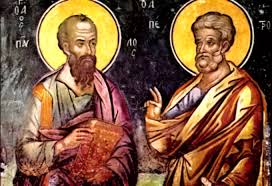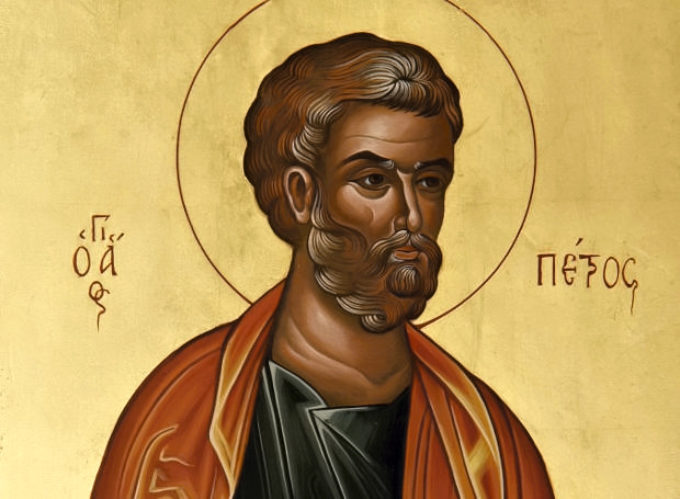Eusebius writes: And Paul preaching to those from the foreign peoples who were in Jerusalem and around it till in Illyria set the foundations of the Churches, this being evinced by the testimonies the churches can give and which were mentioned by Luke in the Acts of the Apostles; but Peter whose words announced Christ in so many dioceses preached as well the Word of the New Testament, thing which is obviously revealed in the epistle which was proven to be his and which he wrote to those Jews found in the Diaspora of Pontus, Galatia and Cappadocia of Asia and Bithinya. And from those who proved to be zealous indeed were considered worthy to lead the Churches founded for them. And we don’t say these with ease since they were gathered from saint Paul’s sayings (Ecclesiastical History, book 3, chapter 4)
Those stated by Eusebius show that he admits the interpretation given by us to saint Peter’s epistles and the fact that it was difficult to say who and how many were considered worthy for being entrusted as leaders of the Churches beside those whose names can be taken from saint Paul’s accounts, meaning from the Acts and from saint Paul’s Epistles. And he says this because he aims as he shows at the beginning of the chapter to relate those referring at the first succession of the Apostles.
Referring at this, at the end of this chapter he writes the following contradictory words: `And Linos, that one who was mentioned as being with saint Paul in Rome according to the Epistle to Timotheus, the first after saint Peter (although saint Paul was the one who wrote the epistle) was shown then by drawing lots as a successor at the Episcopate of the Roman Church, but Clement, who was named as the third bishop of the Roman Church as one who was confessed by this as being a fellow worker and fighter with saint Paul (Ecclesiastical History, book 3, chapter 4,9)
It is surprising how in the same chapter Eusebius affirms and contradicts; the contradiction results from the alternation of a name, that of Peter instead of Paul. The substitution of the name is obvious, fact which we’ll prove by convincing evidence of the critics and historians
a) Clue: That Peter’s name was put instead of Paul’s it shows first because it was not possible that Eusebius contradicted himself, annulleing what he had just said in the same chapter, where he says that he accepts Peter as apostle of those who were circumcised (the Jews) and preacher of the Gospel in the territories mentioned by him in his epistle.
b) Clue: The fact that Peter’s name was put instead of Paul’s it shows in the fact that Linosthe first successor of the Apostle was not a disciple of Peter but of Paul who mentions him in the second epistle to Timotheus as being with him in Rome. This is the third of the persons mentioned as embracing Timotheus, without having any distinctive characteristics to prove that he had any rank. Eusebiu, Prudentiu, Linos, Claudia and all brothers are embracing you. Why doesn’t he mention among his companions the bishop of Rome who was designated by Peter as his successor? And why doesn’t he show him the honor for being the first among the Apostles, the only one on earth who was granted Peter’s throne, Christ’s throne? If the opinions of the papal Church referring at Peter were true Paul had to obey Linos because according to the pseudoclementine epistle all men have the duty to obey him in everything: `obey him in everything knowing that by saddening him you sadden Christ because this throne was entrusted to him who didn’t want to accept it…`no matter if this happened to be apostle Paul. Since Linos was appointed as having Peter’s chair (Christ’s) Paul had the duty to obey that. Why then he considers him as a simple companion from his circle? Why doesn’t he show the respect due to the one who sat on Christ’s chair and places him the third in the row of those who are embracing Timotheus when Linos was supposed to give his blessing due to his rank as popes do. Something like this is obscure and cannot be explained in another way than by accepting the truth testified by the facts themselves: that Linos at the time when Paul wrote his second epistle to Timotheus was nothing else than one of Paul’s disciples. If Linos at Peter’s hypothetical coming in Rome got a rank and when it took place that we aim to study and establish historically the time when Linos was ordained as Bishop of Rome. But it’s clear that Linos was not Bishop of Rome as Eusebius seems to say by the words: the first after Peter is shown by drawing lots as a asuccessor at the Episcopate of the Roman Church. (Eusebius – Ecclesiastical History, book 3, chapter 4)
c) Another hand is that which put Peter’s name instead of Paul’s because there is no historical evidence about his trip to Rome. On the contrary, this idea is rejected: the old testimonies preserved from Proclu and Dionysius of Corinth have already lost their authority being proved the fact that they had extracted their information because of their faith on turbid sources.
This conclusion is proven by their disagreement with the historical truth revealed by the Holy Scriptures and the Ecclesiastical history.
d) The fact that Peter didn’t go to Rome and much less probable before Paul is shown by those related by Luke in the Acts, with accounts full of meaning. Relating Paul’s welcoming by those from Rome, Luke tells the dialogue which took place and from which is revealed something else than Peter’s trip to Rome. Here is what they say in this dialogue:
`We neither received epistles from Judea concerning you, nor have any of the brethren who came reported or spoken any evil of you. 22 But we desire to hear from you what you think; for concerning this sect, we know that it is spoken against everywhere.` (Acts 28, 21-22).
These words have a great significance because they clarify things referring at Peter’s trip to Rome, removing any doubt regarding the fact that he didn’t go there. How could have been possible that they didn’t know anything about Paul if Peter had preached Christianity before him there? How would they have defined Christianity as a Jewish heresy if they had previously been taught by Peter? How would they have said that `it is spoken against it everywhere`?
Wouldn’t they have dissimulated their opposition ? How would they have asked about this heresy that `it is spoken against it everywhere`?
Where was Peter? Where was Clement as his successor? Where was the Christian community? Where was the official Church to come and welcome Paul? How the Jews ran to Apius Forum and to Three Tavernas for welcoming Paul and the Christian Church, its leaders didn’t come to do this? From these questions without answer and which are clarified only by the fact that the evangelical truth hadn’t been spread until then in Rome by any Apostle, we deduce that Peter didn’t go to Rome.
e) We are led to the same conclusion by the fact that Peter’s name is never mentioned in Paul’s epistles written in Rome and where it is nothing mentioned about his arrival there. According to the preserved testimonies – their truth being validated by the critic commentators, Paul going to Rome wrote the following epistles: the epistle to the Ephesians sent through Tychicus, the epistle to the Philippians sent through Epaphroditus, the epistle to the Colossians sent through Tychicus and Onesimus, the second epistle to Timotheus, the epistle to the Jews and the epistle to Titus, although the last one according to studies has the note that it was written in Nicopolis and Macedonia. If Peter was in Rome Paul should have related this fact in one of his epistles: but his silence is in fact an evidence about Peter’s absence. The fact that the excerpt from the History of Eusebius is spurious is shown in chapter 13 of the 3rd book and we shall refer at this in what follows bringing history as evidence after we aim to present all the evidence found in the Scriptures.



